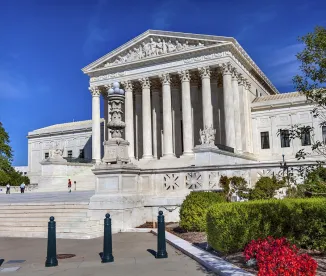On May 24, the Supreme Court weighed in on an issue that for decades has bedeviled litigants under the Comprehensive Environmental Response, Compensation, and Liability Act (CERCLA): When can potentially responsible parties bring a cost recovery action under CERCLA § 107, and when must they bring a contribution action under CERCLA § 113? In Guam v. United States, the Court addressed the trigger for a contribution action under § 113(f)(3)(B) in the common context of a government settlement that does not specify the resolution of CERCLA liability. The Court held unanimously that a 2004 settlement with EPA resolving Clean Water Act claims and requiring Guam to remediate a “280-foot mountain of trash” did not constitute a resolution of Guam’s CERCLA liabilities for the Ordot Dump and did not trigger the contribution provisions in § 113(f)(3)(B).
Key Takeaways
-
To trigger a contribution claim under § 113(f)(3)(B), a settlement must by its terms resolve CERCLA liability.
-
When analyzing whether settlements in other cases give rise to CERCLA contribution actions, courts are likely to scrutinize their text for specific references to CERCLA or express indications that all federal law claims are intended to be resolved.
-
The decision did not address whether a party, like Guam, may pursue a § 107 cost recovery claim to recoup costs incurred to satisfy obligations under another environmental statute.
-
The decision also did not address whether a settlement that expressly disclaims a liability determination and leaves the settling party “open to future enforcement action” can “resolve liability” under § 113(f)(3)(B) and trigger a contribution claim, an issue that Guam raised.
Background and Analysis
The United States Navy constructed the Ordot Dump in the 1940s for the disposal of military waste and later transferred it to Guam. In the late 1990s, EPA determined that the dump was “an ecological hazard” and sued Guam under the Clean Water Act (CWA). The parties resolved EPA’s CWA claims in a 2004 consent decree. Then, in 2017, Guam filed a cost recovery and contribution complaint, alleging that the United States contributed “toxic military waste … for decades” to the dump. Guam’s complaint includes both § 107 and § 113 claims.
The D.C. Circuit determined that the 2004 CWA consent decree with EPA triggered Guam’s contribution rights because it “resolved liability” under CERCLA § 113(f)(3)(B) even though it did not reference CERCLA liability.[1] This determination precluded Guam’s claims. The circuit court held that Guam could not pursue a § 107 cost recovery claim because it had a contribution claim and that Guam’s contribution claim was time-barred under a three-year limitations period. The D.C. Circuit decision addressed circuit splits on two issues that implicate when a CERCLA contribution claim can be triggered: (1) whether a non-CERCLA settlement can resolve liability under § 113(f)(3)(B); and (2) what specific language in a settlement agreement resolves this liability. The Supreme Court granted certiorari on both issues.
In a short decision, the Supreme Court reversed the D.C. Circuit and, only reaching the first issue, held that “[a] settlement must resolve a CERCLA liability to trigger a contribution action under § 113(f)(3)(B).” The Court rejected the United States’ view that a settlement “under another environmental statute” to perform or contribute funds to something that “might resemble” or constitute a functional equivalent of a “response action” could trigger a CERCLA contribution claim.[2] The Supreme Court’s determination was based primarily on the structure of the text of § 113(f). While § 113(f)(3)(B) does not expressly refer to CERCLA liability, the Court interpreted it in light of the “anchor provision” in § 113(f)(1). This “anchor provision,” which provides a right of contribution “during or following any civil action” under § 106 or § 107(a) of CERCLA, assumes that parties with contribution claims are facing CERCLA liability.
The Court expressed concerns that if § 113(f)(3)(B) contribution actions were not connected to an underlying CERCLA liability, they would be transformed into “a free-roving contribution right for a host of environmental liabilities under other laws.” This broader reading disfavored by the Court would violate “the familiar principle that a federal contribution action is virtually always a creature of a specific statutory regime.” It also would require “parties and courts to estimate whether a prior settlement was close enough to CERCLA.” This type of guesswork also would make it difficult for parties to determine whether the contribution statute of limitations has started to run. The “far simpler approach” embraced by the Court “is to ask whether a settlement expressly discharge[s] a CERCLA liability.”
As illustrated by the Guam case, whether a PRP has a § 107 cost recovery claim or must bring a § 113 contribution claim can have significant impacts on the PRP’s ability to recover response costs. Varying statutes of limitations are one difference. Another is that liability under § 107 claims is typically joint and several, which could allow the party initiating the lawsuit to recover all “necessary costs of response … consistent with the national contingency plan” from any other liable party.[3] Though this joint and several liability may be “blunted” with a contribution counterclaim, a successful § 107 claim can shift the burden to other parties to establish their right to contribution.[4]
While the Supreme Court’s decision in Guam v. United States clarifies that settlements under other federal environmental laws do not give rise to a CERCLA contribution claim, the availability of § 107 cost recovery claims and § 113 contribution claims are likely to remain a key battleground in CERCLA litigation. The Court declined to consider Guam’s arguments that the 2004 settlement was not sufficient to “resolve” CERCLA liability because Guam did not admit liability and was “open to future enforcement action.” The decision also did not find explicitly that Guam had a right to a § 107 claim.
[1] “A person who has resolved its liability to the United States or a State for some or all of a response action or for some or all of the costs of such action in an administrative or judicially approved settlement may seek contribution from any person who is not party to a settlement ….”. CERCLA § 113(f)(3)(B).
[2] The term “response” includes “remove, removal, remedy, and remedial action.” CERCLA § 101(25). These terms are defined broadly, which results in high likelihood of “functional overlap” between actions required under CERCLA and actions required under other environmental statutes. See CERCLA § 101(23)-(24).
[3] CERCLA § 107(a).
[4] See United States v. Atlantic Research Corp., 551 U.S. 128, 140 (2007) (A “PRP could not avoid § 113(f)'s equitable distribution of reimbursement costs among PRPs by instead choosing to impose joint and several liability on another PRP in an action under § 107(a). The choice of remedies simply does not exist. In any event, a defendant PRP in such a § 107(a) suit could blunt any inequitable distribution of costs by filing a § 113(f) counterclaim.”); Raytheon Aircraft Co. v. United States, 532 F. Supp. 2d 1306, 1311-12 (D. Kan. 2007) (“If the defendant-PRP shows that the plaintiff-PRP is overreaching and attempting to recover costs for which it is responsible, then the counterclaim for contribution will permit a reckoning. To be sure, the defendant-PRP bears the burden of proof under this approach, but it is an appropriate burden to effectuate the policy considerations which encourage a party, whether it be innocent or not, to clean up and know that it will have recourse for reimbursement”).









 />i
/>i

